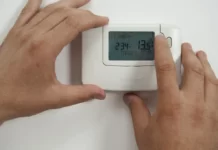If you’re thinking about replacing an electric water heater, there are several reasons to consider heat pump water heaters. It consumes very little power and is quite efficient. But, since we’re here to talk about it, everything has its own set of pros and cons. But, before we get into the heat pump water heater pros and cons, let’s go over the basics of what a water heater is; A water heater is exactly what it sounds like, it heats water by taking cold water from the supply and warms it.
Now comes the topic of what a heat water pump is and how it differs from a standard water heater. A heat pump water heater works by transferring heat from an outside heat source (typically the heat in the surrounding air) to a hot water tank through a compressor, condenser, and evaporator. Heat pump systems only use electricity to move heat; they don’t actually make heat.
Pros of Heat Pump Water Heaters:
1. Efficient
Heat pump water heaters are a more efficient way to heat water than any other standard electric or gas cylinders. Because they get energy from the outside air, the earth, or any water bodies (lakes and ponds) to heat water stored in an insulated cylinder.
2. Less Carbon Emissions
One of the most essential features of the heat pump water heater is its environment friendliness and renewable energy usage. Hybrid heat pumps are one of the most promising technologies for enhancing efficiency and lowering carbon emissions in this industry as it uses energy from outside and this way it limits the release of carbon into the atmosphere.
3. Minor Upkeep required
Heat pump water heaters are less maintenance-intensive than any other standard heating system. Some system details must be examined on a regular basis, once a year, and this may be done easily by yourself so it does not require any maintenance.
4. Long life-span
Heat pump water heaters have a reasonably very long lifespan, up to 50 years, but the typical lifespan is between 14 and 15 years. Regardless of these figures, heat pump water heaters are highly dependable and consistent sources of heat.
5. Better Safety
Heat pumps are less dangerous than any other heating system that relies on combustion. They are safe to use, and because they rely on outside sources for heat rather than burning fuel to create heat, they pose fewer safety risks than any of their other competitors.
Cons of Heat Pump Water Heaters:
1. Upfront Cost
This technique requires a large upfront investment. A Heat Pump Water Heater is often three to four times more expensive to buy than a standard type. A system like this can cost anywhere from $15,000 to $20,000 to buy and install, depending on your need.
The efficiency rating of the system, the layout of your home, the brand, and the season are all key aspects to consider. For example, purchasing a heat pump water heater in the early winter may be more expensive due to increased demand for this sort of equipment.
2. Cold Climate Change
When the temperature drops below 0 degrees Fahrenheit, a heat pump water heater may need to be complemented with a second heating source to keep your home warm. Such systems have difficulties in cold places, which can lead to system damage. As a result, maximum heat pump water heater efficiency in cold weather is not possible. Yet, an enhanced system that solves this issue is feasible for cold places.
3. Substantial Effort
Heat pumps are difficult to install because they require a study on heat flow, local geology (particularly for ground source heat pumps), and your household’s heating and cooling needs. A heat pump water heater installation also demands a large amount of work and inconvenience to your home and landscape-like incisions through the building cladding.
4. Electricity dependency
Although using an electric air-source heat pump system is safer than running a gas furnace or boiler, it might become dysfunctional during a power loss.
Choosing a typical burner, on the other hand, will not protect you from the effects of electrical distribution problems.
Bottom Line:
We hope you got cleared with your question about the heat pump water heater pros and cons. The benefits of heat pump water heaters clearly show that they are a wise long-term investment. Heat pump water heaters are certainly worth it, given that the operating expenses save you money on your energy bills because the mechanism just transports heat from one place to another rather than creating it. With the upcoming new heat and building strategy, it is expected that the use of different heat pump water heaters as a low-carbon heating option would grow even further.
You may be concerned about the high upfront fees, but you must also consider the broader picture. Solar panels combined with heat pump water heaters are equal to a road to net-zero energy. Heat pump water heaters come in a variety of styles, each with its own mechanism. Heat pump brands provide a wide range of functions, with the express purpose of making your life simpler.













